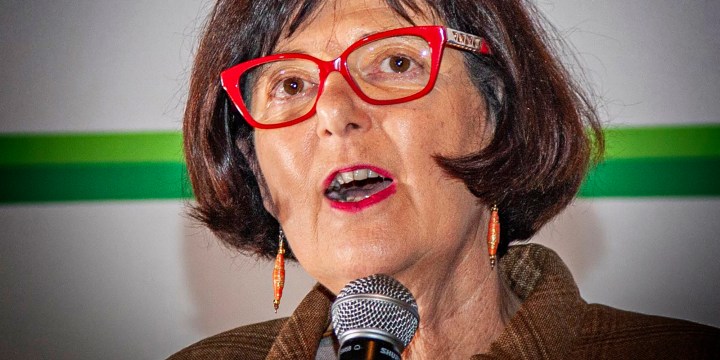ROAD TO COP27
A ‘just transition’ must help SA meet its developmental objectives and fight poverty – Barbara Creecy

Minister of Forestry, Fisheries and the Environment Barbara Creecy on Monday laid out South Africa’s position and expectations for COP27, the UN climate conference in Egypt next month. Issues of funding and a rebuilding of trust between developed and developing countries were at the forefront.
“One of the issues that we are all interested in understanding is what does the African COP [Conference of the Parties] mean for our country as a country on the African continent,” said Minister Creecy.
“We’re hoping that this is going to be an opportunity to raise ambition on mitigation, adaptation and support for developing countries.
“We’re hoping that it’s going to advance financial arrangements around loss and damage. And we hope that it’s going to build on the progress that we made at Glasgow, on the importance of the concept of just transition.”
Creecy was speaking on Monday in a joint meeting of the Presidential Climate Commission (PCC) and her department ahead of the UN climate conference scheduled to be held in November in Egypt.
The minister went on to lay out four key issues, as well as South Africa’s position and expectations ahead of the conference.
South Africa secures ‘watershed’ finance deal to reduce coal reliance
The United Nations Framework Convention on Climate Change (UNFCCC) explains that “the solution to the climate change problem rests in decreasing the amount of emissions released into the atmosphere and in reducing the current concentration of carbon dioxide (CO2) by enhancing sinks. Efforts to reduce emissions and enhance sinks are referred to as mitigation.
“Now, the first issue we think is going to need to be on the negotiating agenda at COP27 is, we would want to see developed countries honouring the mitigation and vision that they tabled in Glasgow.
“And we would not want to see a situation where developed countries that are responsible for the climate crisis are backtracking on the commitments that they made last year,” said Creecy.
Read more in Daily Maverick: “The Glasgow Climate Pact: A global compromise that barely keeps the goal of 1.5°C alive”
The minister continued: “The second issue that we would want to see on the agenda is this issue of the just transition. And what we’re saying is that as African countries meet their obligations in terms of the Paris Agreement, it’s very important that we meet those obligations in a way that supports climate justice.
“And our just transition framework has really defined climate justice in three senses.
“First of all, it defines climate justice, that those who are vulnerable and who are impacted on by climate change must be part of any discussion or any negotiations that are taking place.
“Secondly, we have said that as transitions take place, we can’t have a situation where some sections of our society – probably the private sector – reap the benefits of the transition and the risks are carried by workers in vulnerable industries and the … vulnerable communities where those workers live.
“There has to be an equal sharing of risks and benefits.
“And lastly, our concept of climate justice suggests that the way in which we enter into this transition has to help us with our overall developmental objectives. It has to help us with economic inclusiveness. It has to help us in fighting poverty and inequality.
“And, of course, it has to help us in creating decent jobs.”
Six key considerations underpinning South Africa’s nascent ‘just transition’ plan
The “third issue”, said Creecy, “is increased funding for adaptation”.
The UNFCCC defines adaptation as referring to “adjustments in ecological, social, or economic systems in response to actual or expected climatic stimuli and their effects or impacts”.
Visit Daily Maverick’s home page for more news, analysis and investigations
“So, we all know the story with regard to climate financing, and that story is that commitments have not been honoured.
“And as a subset of the issues under that, there has been less money available for adaptation than there has been for mitigation. And we are saying that there has to be increased financing available for adaptation and that has to be a central aspect of the global goal on adaptation.
“We would like to see COP27 resolving the multiple issues.
“And, of course, it’s very important that we now start to address the financing issues for the post-2025 era,” said the minister.
She noted: “We need a proper work programme on adaptation. And that work programme must inform the global stocktake on the assessment of progress. So, just as we’ve had global stocktakes on how far have we gone in realising mitigation objectives, we need a global stocktake on adaptation.
“And we need to make sure that there are clear goals and targets for adaptation, and that those goals and targets are linked to concrete numbers around financing.
“And, clearly, there would need to be support in a range of sectors. Infrastructure, the built environment, water and food security all being important areas that would need to be considered.
“We need a clear road map on this concept of ‘doubling the finance’ that’s available for adaptation by 2025. So, this has been rhetoric that we’ve heard over and over again – we need to understand how we are actually going to get to doubling this adaptation financing and … the timing and the mechanisms for implementing this doubling of adaptation financing.
“Now, on mitigation, we’re saying that we would want … to reaffirm consideration of domestic circumstances and capacity in the realisation of mitigation ambition, but we definitely do not want to see a situation where developed countries renege on their ambition and try and push their responsibilities on to developing countries.
“And we would want to make sure that any new targets are backed with financial support.”
The minister went on to outline what adaptation might cost the African continent.
“There are a whole range of studies that have been done. This particular one indicates that adaptation costs for the continent will range somewhere between $259-billion and $407-billion. That’s for the whole continent over the next 10 years.
“And that, on average, we would be needing – to meet adaptation needs – somewhere between $26-billion and $41-billion.
“A lot of the problem with the existing financing is that it’s not new… it’s difficult to quantify and it’s definitely not predictable. We need to know when the $100-billion target will be met, because this is a fundamental issue around trust and around rebuilding trust between developed and developing countries.”
Read more in Daily Maverick: “Between coal and a hot world: Developed countries pitch…”
The fourth key issue was resolving the multiple options for addressing loss and damage.
Carbon Brief explains that loss and damage is a “term used to describe how people – particularly the poor and vulnerable – are already reeling from the impacts of human-caused climate change … predominantly driven by the emissions of a wealthy minority”.
Though recognised by parties to the UNFCCC in Article 8 of the Paris Agreement, there is no dedicated finance mechanism or fund which can be understood as being “climate reparations”.
“Now we’re imagining … that loss and damage is going to be a very thorny issue at COP27 … the cost of loss and damage on our continent over the next 10 years is predicted to be somewhere between $289-billion and $440-billion.
“We want COP27 to finalise agreement on the governance of loss and damage under the Santiago Network, and it’s going to be very important that we engage there on the scale of support as well as programming options.
“It’s also going to be important that the type of support is going to come directly to governments … that it’s going to have a public finance aspect as well as a loan finance aspect, and that it’s linked to this very vexed issue of debt reform.
“And lastly … it is going to be important that this financing once again, does not exacerbate the indebtedness.”
So, what would be needed to see success around all these issues for South Africa in particular and Africa in general?
“We’re going to have to narrow the gap between the pledges and the actual implementation … to rebuild trust between developed and developing countries.
“We’re going to have to have a clear commitment to supporting climate justice or just transitions in developing countries…
“We’re going to have to build momentum for clear global economic reforms around the multilateral development banks and debt restructuring to reduce the debt burden that the climate transition is going to place on developing countries.
“And, of course, as always, we stand ready and we hope we will be able to play a constructive role in the talks.” OBP/DM



















 Become an Insider
Become an Insider
Madam Minister – simply ensuring that people stop living in the worst air pollution in the world would begin to create actual benefits for people who are not connected to your comrades. That’s a just transition. Justice would be if all of you in the upper echelons of the ANC had to actually start answering questions about where the hundreds of millions siphoned into Charter House’s back pocket from the tender process for Kusile and Medupi went, a fair question when you consider how often ANC employees aren’t paid…
Seems OK – I just don’t think that developed countries should be obliged to hand the money over directly to governments. Some African governments are known to be corrupt and may use the money for other purposes, which will then lead to reluctance of the developed world to go on with this financing. If the developed world wants to organise the necessary projects themselves in our countries, after networking it with that government and on condition that where possible, Africans will be used to complete it, it should be allowed.